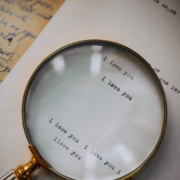Under Lockdown
 Yesterday I once again got the dreaded, automated call from my daughter’s high school — the third time this school year — “under lockdown.”
Yesterday I once again got the dreaded, automated call from my daughter’s high school — the third time this school year — “under lockdown.”
My gut twisted and the muscles in my shoulders and arms seized up. I had that weird fight or flight adrenaline rush, weird because there was no where to go and nothing to do.
This call came late in the day (the last one took up a 3 1/2 hour chunk in the middle of the day), and when I texted Emma she was able, almost immediately, to report that she was safe, and they were being allowed to leave the school. She called it “being evacuated,” but just leaving the damn place was good enough for me.
This morning, at work in my writing cabin, I found myself reflecting on how context changes everything. Kind of like what I used to tell students about point of view. A new point of view = a new story.
I can be frustrated to the point of — I don’t know what — with this kid, ready to wrap her up in duct tape for the duration of her teen years, at the minimum, and then something threatens her safety, and I — just — want — her — to — be — okay.
During the last lockdown, the 3+ hour one, the kids had to use a bucket in their classroom for a toilet. They had water bottles to drink, and a few kids had packed lunches in their backpacks and were willing to share. Twice the police banged on the door and entered, making my daughter and the other students stand along the walls with their hands on their heads. (The most terrifying moment in the whole day, for Emma.) In Emma’s eyes, they were innocent teenagers locked in a room with a bucket for a toilet and not enough to eat. For the police, they were potential terrorists (I guess), or hostages harboring — in fear — some menace hiding behind a cabinet door or pretending to be one of them. See how the context shifts?
Emma says “it’s no big deal.” But yesterday, she went to bed about 5:00 and slept until 5:45 this morning when I woke her…to go back to school.


 Imagine that an anthropologist is studying your life.
Imagine that an anthropologist is studying your life.

 But what was the point?
But what was the point?